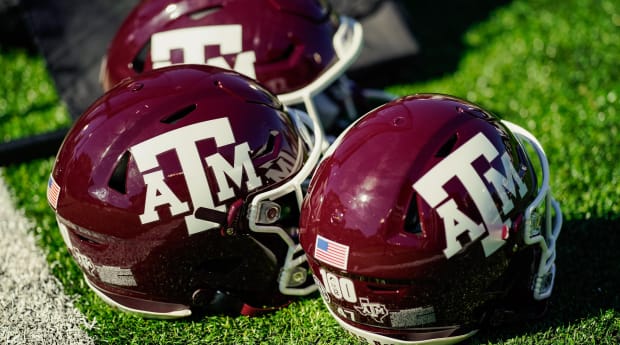Two weeks after Texas A&M announced a first-of-its-kind name, image and likeness initiative through its fundraising foundation, the NCAA sent a memo to member schools Monday that appears to be directed at the Aggies’ new model.
In the short email obtained by Sports Illustrated, NCAA executive vice president of regulatory affairs Stan Wilcox reminded administrators that the association’s current rules prohibit a school from compensating athletes for NIL, including “entities acting on behalf of the institution.” The memo also expressly stated that schools are prohibited from providing assets to “entities engaged in NIL,” such as priority points to stadium seating and access.
Though the email does not mention a specific school, Texas A&M appears to be in the crosshairs.
On Feb. 15, Texas A&M’s fundraising arm, the 12th Man Foundation, announced the creation of the 12th Man+ Fund, an NIL initiative allowing donors to contribute to a fund that distributes payments to athletes. While the 12th Man+ Fund does not describe itself as an NIL “collective,” it operates as such while under the university—believed to be a first in the country that a school’s booster organization is so heavily involved in the NIL space.

Jay Biggerstaff/USA TODAY Sports
Donations to the 12th Man+ Fund, like those to the 12th Man Foundation, are tax-deductible and earn benefits such as priority points, the foundation’s announcement said. In satisfying the NCAA’s policy for a quid pro quo, athletes are paid by 12th Man+ to promote the foundation itself through social media posts and appearances.
In an interview with SI on Wednesday, Texas A&M athletic director Ross Bjork acknowledged the memo and said the university cleared the initiative through its compliance department.
“When we were approached by the 12th Man Foundation, we made sure their initiative followed state law and NCAA guidelines,” Bjork says.
A&M notified the NCAA and SEC of the initiatives before the announcement, he says. However, neither entity necessarily cleared or approved of the initiative.
“Texas A&M notified the NCAA that an NIL-related announcement was upcoming,” NCAA spokeswoman Meghan Durham says. “However, the NCAA did not review or approve any concept prior to the announcement.”
The Aggies’ announcement two weeks ago made a splash across the NIL landscape. Despite drawing donations from the same or a similar pool of boosters, NIL collectives are normally kept completely separate from a school’s athletic department and its fundraising arm.
However, amendments to state NIL laws are lifting prohibitions on a school’s involvement with NIL. In a race for their schools to be more hands on, state lawmakers are adjusting legislation to make it easier for them to facilitate and connect athletes with NIL deals, and even the NCAA’s latest clarification of guidelines last fall make it easier for schools to communicate with NIL collectives and direct donations their way.
Many college administrators believe they should have more oversight and control of collectives, which in some cases have raised millions of dollars from donors that they are distributing to athletes for NIL activities—at times without a school’s consent. The 12th Man Foundation initiative opens the door for such oversight and is certain to be a blueprint followed by many programs.
In fact, officials from multiple SEC athletic departments tell SI that they are exploring the concept of running their NIL operations through their fundraising arms.
“This is going to be the way we all do it eventually,” one school athletic official says. “What does that mean for collectives? Maybe they go away.”
For months now, one SEC school has been operating quietly in a similar manner. Arkansas’s collective, ONEArkansas NIL, is closely associated with the Razorback Foundation and partners with athletes from the state to promote nonprofit organizations.
“A&M is going further,” says one expert within the NIL industry.
Whether A&M is violating the NCAA’s NIL policy is a matter of debate. Is the A&M fundraising arm too tethered to the university to be operating NIL? Is the quid pro quo —athletes endorsing the foundation itself—legal in the NCAA’s eyes? After all, the foundation’s mission is to support the university—another close tie.
As for providing priority points to boosters for gifts to the 12th Man Foundation’s collective, Bjork says donors still must make separate donations tethered to season tickets to receive benefits such as priority points. Many foundations, like A&M’s, own such assets, leasing them from a university.
In an interestingly timed move, the NCAA’s memo comes in a week when officials from at least a dozen high-level collectives are gathering in Indianapolis on Thursday.
“We all want to try to bring NIL in-house,” says one official with an SEC collective, “but we’ve been told we can’t. Well, A&M has now done it.”
SI senior writer Pat Forde contributed reporting.







